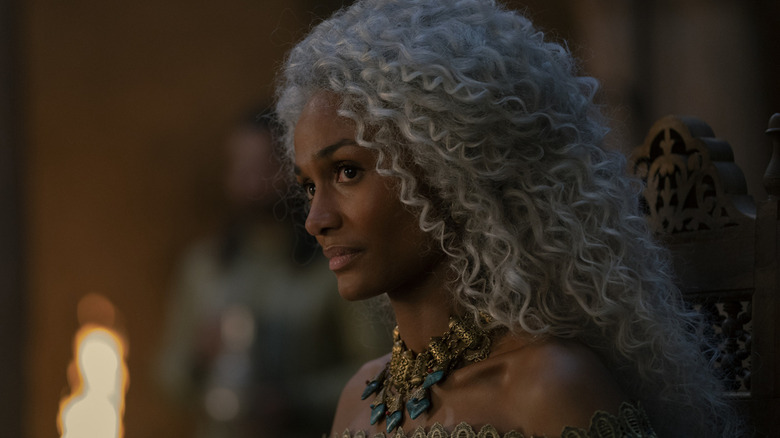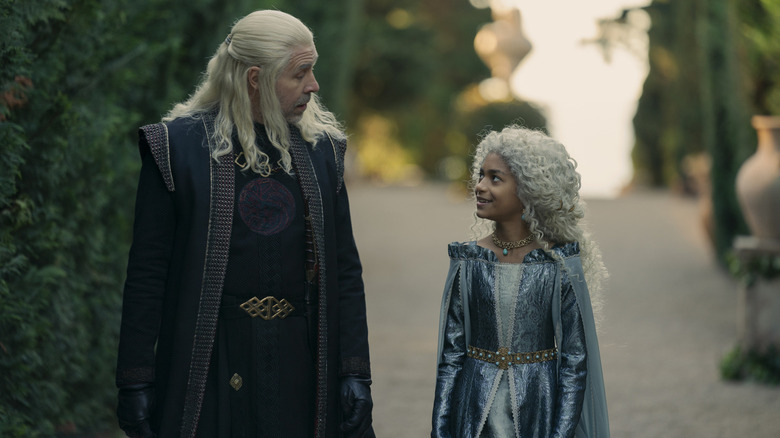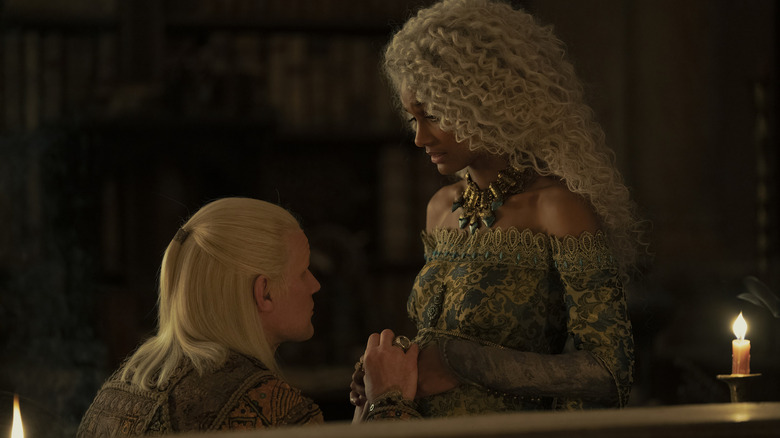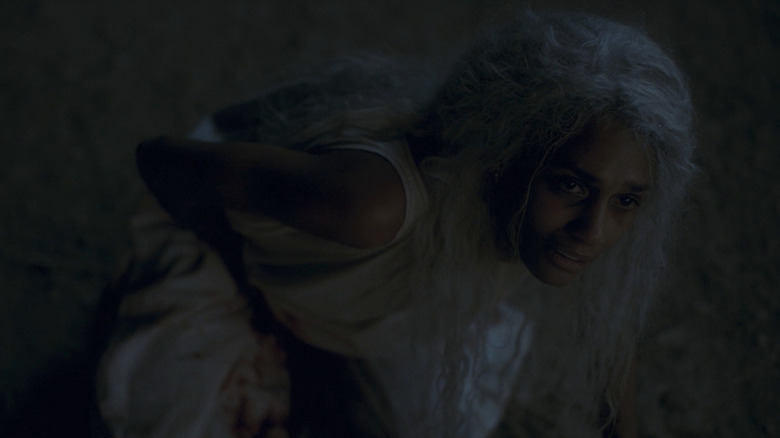How The House Of The Dragon Time Jump Does A Disservice To Laena Velaryon
This post contains spoilers for "House of the Dragon."
The most beautifully tragic moment of "The Princess and the Queen," the sixth episode of "House of the Dragon," does not center on either of the characters in the title. No, that moment belongs to Laena Velaryon (Nanna Blondell). As she is giving birth to what would be her third child with Daemon Targaryen (Matt Smith), it becomes clear that she will not make it out of this birth alive, and most likely, neither will the child. This is a very similar circumstance to that of Queen Aemma (Sian Brooke) in the first episode of the series, where King Viserys (Paddy Considine) decided to sacrifice his wife to possibly save the child (which did not happen). Instead of leaving that decision up to her husband or anyone else, Laena makes the choice to go out on her own terms with a death befitting a dragon rider, calling out to her dragon Vhagar to burn her to death.
It is a deeply moving sequence where a woman in Westeros actually gets to make a decision about her own fate, a rarity in this patriarchal universe. However, once it was over, I was left with an uncomfortable feeling. For as beautifully designed as the moment itself is, I found the whole ordeal to be strangely hollow in retrospect. This is not a blight on Nanna Blondell's wonderful performance as Laena or Miguel Sapochnik's direction of the sequence. No, this all comes back to how Ryan Condal and the series writers have decided to structure this show. They want us to be overwhelmed by the tragic implications of Laena's death, but they have done almost nothing in the proceeding episodes to truly make us invest ourselves in her. You can't create a satisfying payoff out of nothing. It needs to be earned.
A life on fast forward
Over the course of the first six episodes of "House of the Dragon," Laena Velaryon has been played by three different actors: Nova Mosé-Foueillis, Savanna Steyn, and Nanna Blondell. A lot of us are having some trouble connecting with Emma D'Arcy and Olivia Cooke due to our connections to Milly Alcock and Emily Carey, who already played the roles of Rhaenyra and Alicent. But not only has Laena gone through more actors, but she's also had substantially less screen time. The character hasn't even appeared in every episode thus far.
In theory, you can sustain a cast member change if the audience has connected with them already. However, every other time "House of the Dragon" used Laena until this point has been, frankly, inessential. Our first encounter with her comes when she is 12-years old and her father, Lord Corlys (Steve Tousaaint), proposes she marry King Viserys (Paddy Considine). The scene is meant to elicit uncomfortable laughs. Laena is a prop, used by both her father and the writers of the show.
The next time we see her, she is a few years older and does some flirting with Daemon at Rhaenyra's wedding feast. Through these episodes, the only thing we learn about her is that she likes dragons. She is playing a role in these scenes, not letting us into her true inner life. In that walk with Viserys, she is even parroting the words of her father. By the time Nanna Blondell shows up in episode six, she has to essentially build an entire character from scratch because basically nothing has been established about her.
Missing out on growth
In "The Princess and the Queen," we learn that Laena did not have her dragon Vhagor until she was 15 years old. Considering her love of dragons is basically the only thing we know about her, seeing her connect with this dragon, which just so happens to be the largest in existence, would do so much to connect us with this woman. Unfortunately, this momentous occasion in her life — one that directly connects with her death — occurs off-screen.
Also off-screen is her entire relationship with Daemon Targaryen. We are meant to glean a full decade of courtship, marriage, and parenting within just a couple of brief scenes in one episode of television before her death. There are clearly glimmers of affection and respect between the two, but that relationship has no weight. I could say a similar thing for Rhaenyra's not-so-secret relationship with Ser Harwin Strong. For us to care that this relationship is coming to a tragic end, we need to know what it was like beforehand, to know how strong or real their love was for both each other and their children.
We never experience the major moments of Laena's life. All the show can do is tell us about what happened and hope that is enough. While that might fill us in on information and lore, it does very little to help us emotionally invest ourself in her. To truly know someone, we need to spend time with them, and "House of the Dragon" just did not make time for Laena.
Is Laena in the fridge?
My biggest fear about Laena Velaryon's death is that this will be a classic case of "fridging." For those who don't know, fridging is when a female character in a story dies or is harmed in some serious way solely for the purpose of motivating the male hero of the story. I worry that her death just occurs simply in order to send Daemon Targaryen's story in another direction. While he can't exactly enact revenge for what happened, I don't want his grief to be the only thing that comes from this. But because we spent so little time with her and so much more with him, I worry this is the only way it can go.
In a show that purports to be about its women — Rhaenyra and Alicent are the two lead characters at this point — it is incredibly disappointing to see Laena Velaryon meet her end this quickly when so much more could have been done with that character. The optics of it don't look too great either, considering she is the only somewhat major character who is a Black woman.
I think the time jumps are beginning to take their toll on the show's storytelling, making it a show about its plot rather than its people. "Fire & Blood," the book that this show is based on, is written as if it were a history book of the Targaryen family, a stringing together of major events that occur within timeline. While that is good for a compendium, it is not so good when you are creating a dramatic story that requires robust character development. With Laena Targaryen, we did not get it, and now, we never will.



